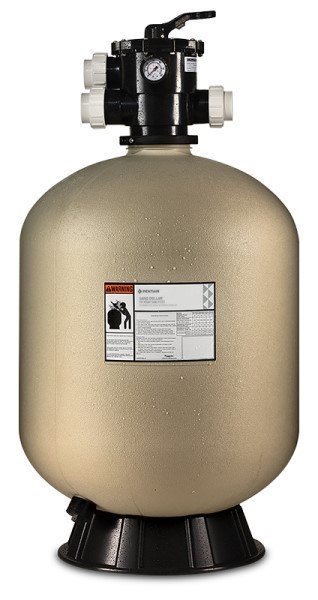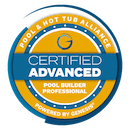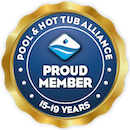The swimming pool pump is the heart of your entire pool operation.
If you’re in the market for a swimming pool pump, you’re likely looking for efficiency, reliability, and performance. With so many options available, it can be challenging to choose the right one for your needs. Without a quality pump – and Hawaiian uses Pentair products – the water would become stagnant, likely turn green and none of the impurities would be moved through the filter.
That’s where we come in. In this guide, we’ll break down everything you need to know to make an informed decision when selecting a swimming pool pump. By the end, you’ll have the knowledge you need to confidently choose the perfect pump for your swimming pool. Let’s dive in.
Importance of Swimming Pool Pump
Efficient pool maintenance relies heavily on the often underestimated component – the swimming pool pump. Its significance can’t be overstated in keeping your pool water clean, clear, and safe for use.
Circulation
The pump ensures proper water circulation, preventing stagnation and the buildup of algae and bacteria, which could compromise water quality and pose health risks to swimmers.
Filtration
By pumping water through the pool filter, debris, dirt, and other contaminants are effectively removed, maintaining water clarity and hygiene.
Chemical Distribution
The pump aids in the even distribution of pool chemicals, such as chlorine, ensuring consistent sanitation levels throughout the pool.
Prevents Water Damage
Adequate circulation and filtration provided by the pump help prevent potential water damage to pool surfaces and equipment by minimizing the accumulation of harmful substances.
Energy Efficiency
Investing in a high-quality, energy-efficient pump can significantly reduce energy consumption and operational costs over time, making it a wise long-term investment for pool owners.
Technical Factors to Consider When Buying a Swimming Pool Pump
When it comes to selecting the perfect swimming pool pump, diving into the details is essential. Let’s break down the technical considerations that ensure you make a savvy choice for your swimming pool.
Pump Size and Power Efficiency
Matching your pump’s capacity to your pool’s size ensures optimal water circulation, a fundamental for crystal-clear waters. Equally important is the pump’s power efficiency. Look for models equipped with motors designed to sip rather than gulp electricity, saving you bucks on your utility bill in the long run.
Variable Speed Capability
Embracing flexibility in your pump’s speed settings can be a game-changer. Variable speed pumps allow you to tweak flow rates to meet the unique demands of your pool, whether it’s a lazy Sunday float or a high-energy pool party. Such adaptability not only conserves energy but also extends the lifespan of your pump.
Durability and Corrosion Resistance
Pumps endure a harsh environment, facing off against water and chemicals day in, day out. Opt for pumps built tough, crafted from corrosion-resistant metals or robust polymers. These materials promise longevity and reduce the hassle of frequent maintenance, letting you focus on enjoying your aquatic haven.
Noise Level
Silence is golden, especially when it comes to your poolside serenity. Modern pump designs prioritize tranquility, employing noise-reducing features to keep decibel levels at a minimum. This consideration is crucial, particularly if your pool shares real estate with living areas or entertainment spaces.
Compatibility with Automation Systems
Streamlining your pool’s management is a breeze with automation systems. Ensure your pump plays nice with these technological marvels, allowing seamless integration for effortless control and monitoring. With compatible systems in place, you’ll have more time to bask in the joys of pool ownership, hassle-free.
Money-Saving Swimming Pool Pump Tips
Maintaining a swimming pool can be costly, but with the right strategies, you can keep expenses down without sacrificing quality.
- Look for pumps with high ENERGY STAR ratings to reduce electricity costs.
- Set your pump to run during off-peak hours to save on electricity bills.
- Ensure your pump is appropriately sized for your pool’s needs to avoid unnecessary energy consumption.
- Keep your pump clean and well-maintained to optimize performance and prevent costly repairs.
- Upgrade to a variable speed pump for greater energy efficiency tailored to your pool’s requirements.
Troubleshooting Common Swimming Pool Pump Issues
When it comes to keeping your swimming pool running smoothly, the pump plays a crucial role. However, even the most reliable pumps can encounter issues from time to time. Identifying and troubleshooting these problems promptly is key to ensuring your pool remains crystal clear and inviting.
Lack of Prime
If your pump is struggling to prime or maintain prime, it could be due to air leaks in the suction line, a clogged impeller, or a malfunctioning pump lid o-ring.
Low Flow Rate
A decrease in water flow can result from a variety of issues, including clogged skimmer baskets, blocked suction lines, or a dirty filter. Regular maintenance and cleaning can often resolve this problem.
Strange Noises
Unusual noises like grinding, squealing, or rattling could indicate worn bearings, a loose motor mount, or debris caught in the impeller. Investigating and addressing these noises promptly can prevent further damage.
Leaks
Leaks around the pump housing, fittings, or plumbing connections can lead to water loss and decreased efficiency. Tightening connections, replacing damaged seals, or repairing cracks can often resolve leak issues.
Overheating
If your pump motor is overheating, it may be due to insufficient airflow, excessive load on the motor, or a malfunctioning thermal overload protector. Ensuring proper ventilation and addressing any underlying issues can prevent motor burnout.
FAQs
How long should a pool pump be run?
Ideally, a pool pump should run for about 8 to 12 hours a day to ensure proper filtration and circulation. However, factors such as pool size, usage, and environmental conditions can influence the optimal runtime.
What is the turnover rate for a pool pump?
The turnover rate refers to the amount of time it takes for the pump to circulate the entire volume of water in the pool. A typical turnover rate is around 8 to 12 hours, meaning the pump should be able to circulate the entire pool’s water volume within this timeframe for optimal filtration and water quality.
How often should pool pump filters be cleaned?
Pool pump filters should be cleaned regularly to maintain optimal filtration efficiency. Depending on the type of filter (e.g., cartridge, sand, or DE), it’s generally recommended to clean or backwash the filter every 1 to 3 months, or as needed based on the pressure gauge reading.
How can I improve energy efficiency with my pool pump?
To improve energy efficiency, consider installing a variable-speed pump, which allows you to adjust the pump’s speed based on your pool’s needs, saving energy compared to traditional single-speed pumps. Additionally, maintaining proper water chemistry, cleaning filters regularly, and optimizing pump runtime can help reduce energy consumption and operating costs.
Choosing the right swimming pool pump is crucial for maintaining a sparkling pool year-round. With careful consideration and proper maintenance, you can enjoy crystal-clear water and worry-free swimming experiences.







